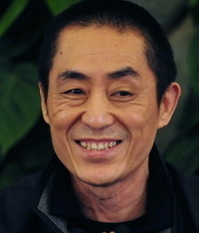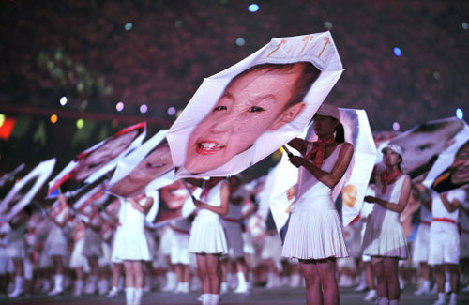For internationally acclaimed Chinese filmmaker Zhang Yimou, designing yesterday's opening ceremony for the Beijing Olympics was far more challenging than making one of his signature films.
"The workload and the difficulties I encountered were 100 times that of my films," Zhang said.
"The films are personal works, the success of which matters only to the director. But directing the Olympic opening ceremony is totally different. It determines whether the Games get off to a successful start or not."

Zhang Yimou
|
As chief director of the opening ceremony, Zhang had promised the world a romantic theme and the use of advanced multimedia technology.
"I wanted the theme to be romantic, as the slogan of the Beijing Olympics, is One World, One Dream," Zhang said.
The creative team for the event was named by BOCOG on April 16, 2006, and by the end of that year, the Beijing Olympic Opening and Closing Ceremonies Production Center had been established.
Led by Zhang, the team included a host of talented artists, including Zhang Jigang, Chen Weiya, Yu Jianping, Chen Qigang and Cai Guoqiang.
They set to work immediately, first meeting to brainstorm in Hengdian, Zhengjiang province, where Zhang was working on his film Curse of the Golden Flower.
"Zhang is very hardworking and put his all into the Olympic ceremonies," Zhang Heping, director of BOCOG's opening and closing ceremonies department said.
"He slept only two to three hours a day during that period."
For the chief director, the ceremony should not be just a grand performance, Zhang Yimou said.
"Chinese spectators are very critical, as they have watched so many performances," he said.
"The basic elements of a performance are singing and dancing what we needed to find was something unprecedented based on song and dance."
After watching the opening ceremony of the 2004 Athens Games, Zhang said he learned some of the elements required for a successful event.
"The opening ceremony of the Athens Games highlighted artistic stage performances," he said.
"For the Beijing Games, we wanted to combine multimedia, traditional stage performances and traditional Chinese group calisthenics."
The final plan for the event jelled about a year ago.
In the 50-minute ceremony, Zhang used Chinese cultural icons - scroll painting, calligraphy, Peking opera and dance - to celebrate the country's 5,000-year history, and an astronaut and space capsule to symbolize its progress in the 21st century.
The show began with a countdown to the opening with 2,008 drummers forming the numbers of minutes.
"The countdown was very difficult to choreograph, as it lasts just a few seconds," Zhang said.
"Almost all of the previous ceremonies used a video for the countdown, but I wanted something unique," he said.
Besides the performances, how to display the five Olympic rings and release the peace dove, traditional parts of all Olympic ceremonies, were also big challenges for Zhang.

Performers hold pictures of multi-ethnic children during the opening ceremony of the 2008 Beijing Olympic Games in Beijing on August 8, 2008. The three-hour show at Beijing's iconic "Bird's Nest" national stadium is set to see more than 15,000 performers showcase the nation's ancient history and its development. [Agencies]
|
"When I watched the promotional videos from former Games, the moments the five rings are displayed were the most impressive parts, such as the rings rising from the water in Athens," Zhang said.
"I hope the five rings formed by light-emitting diodes in the Beijing Olympics will also be memorable."
Zhang said he is proudest of the 70-m scroll to which all the participants contributed.
"We got the idea from the very beginning of painting on a scroll throughout the ceremony," he said.
"The scroll served as the platform for all the speechmakers and also for lighting the cauldron. The athletes finished 'painting' the scroll with their footprints.
"I believe it is unprecedented," he said.
"We didn't want to show only our own culture, we wanted something global.
"The painting symbolized the footprints of all mankind."